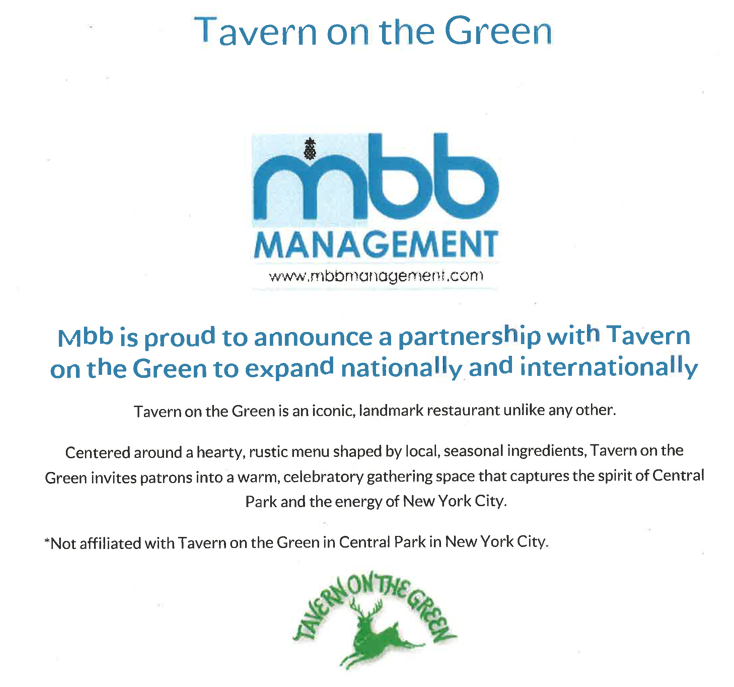I have a crush on the trademark assignment agreement of the Tavern on the Green mark. It’s a tour de force of drafting.
In a nutshell, for decades the City of New York leased the premises for the famous Tavern on the Green to a restauranteur. In 2009 the restauranteur lost its lease, but by then had registered the TAVERN ON THE GREEN trademark for restaurant services and for salad dressing and oils (now dead, but a new application is pending and stands opposed by the City of New York). The restauranteur filed for bankruptcy, claiming that the trademark assets were worth $19 million. The retauranteur lost the lawsuit over the ownership of the name, after which the City and the trustee in bankruptcy entered into a stipulated settlement agreement that would allow the assignment of trademark rights for restaurant services outside of of New York, New Jersey, Connecticut and certain parts of Pennsylvania as long as the concurrent user added a geographic identifier to “Tavern on the Green,” e.g., “Tavern on the Green – Los Angeles” and the remote locale did not mention or refer to Central Park or the Central Park restaurant.
In 2011 a buyer paid $1.3 million for the rights, but the arrangement has already gone south. This is the telling part of the decision:
Tensions finally came to a head on February 16, 2017, when Gerald Singleton, an attorney in the City’s Law Department, sent a letter to TOGI’s attorney claiming that TOGI had violated the Use Agreement. Specifically, Singleton asserted that MBB Management, a “restaurant licensing consultant” hired by TOGI to market Tavern on the Green restaurant franchises, violated Section 2.04(c) of the Use Agreement when it launched a marketing campaign that invoked “the spirit of Central Park and the energy of New York City.”
Of course they violated it. The agreement essentially prevented the not-New York Taverns on the Green from riding on the coattails of the New York establishment. I’m not sure why that arrangement was worth anything at all, much less $1.3 million. So it’s no surprise that a marketing company saw what it thought was a missed opportunity and recommending referring to the “spirit of Central Park” in marketing.
The City of New York brought suit against Tavern on the Green International for breach of contract, trademark infringement, false designation of origin, dilution, unfair competition and violation of New York Business Law. And the agreement did the job it was designed to do. The court granted summary judgment in favor of the City on its breach of contract claim for breach of section 2.04(c) of the agreement, which is the one prohibiting reference to Central Park. Notably, the agreement said
Concurrent User acknowledges that the City will suffer immediate and irreparable injury by reason of any breach specified in Section 12.02 [which cross-referenced 2.04] and 12.03 that is not cured within the time period specified therein, and agrees that remedies available at law (such as monetary damages) are inadequate to compensate for such injury.
The court acknowledged that an injunction for breach of contract was unusual, but “because the contract at issue here involves intellectual property rights in valuable trademarks, and because the parties have agreed that in the event of a breach by TOGI, ‘the City will suffer immediate and irreparable injury,’ the Court is persuaded that injunctive relief is clearly appropriate.”
The court also found that the City had proven ownership of a mark and likelihood of confusion, but not “damages” (I assume it meant “harm”). A dilution claim was made good with little examination also by virtue of the drafting of the agreement:
As for the third element, blurring ‘is an “association arising from the similarity between a mark or trade name and a famous mark that impairs the distinctivness of the mark.” ‘ Given the parties’ stipulation in the Use Agreement that a ‘likelihood of consumer confusion shall be presumed to exist’ in the event of a breach, there can be little question that the parties’ use of the exact same name to refer to different sources of similar products (i.e., restaurant services) will amount to dilution by blurring.
City of New York v. Tavern on the Green Int’l LLC, No. 17-cv-1376 (S.D.N.Y. Sep. 28, 2018).

This work is licensed under a Creative Commons Attribution-NoDerivatives 4.0 International License.


Leave a Reply